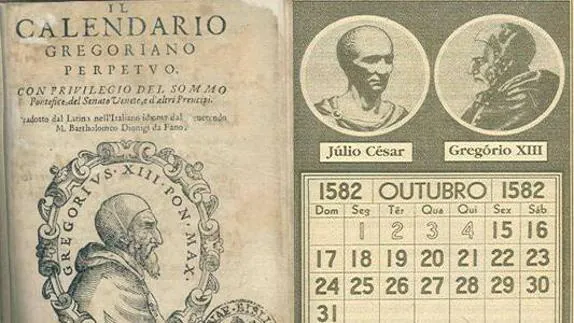

Secciones
Servicios
Destacamos

Charles Dowles
Friday, 6 October 2017, 09:35
If you lived in Spain 425 years ago; this date - Thursday 6 October - did not exist, in fact, nor did the day before, nor the following eight days. When the clocks struck midnight to bring Thursday 4 October 1592 to a close, the calendars did not turn to Friday the fifth, but instead, people from all over Spain hopped to Friday 15 October, jumping 10 calendar days in one tick of the clock.
The full 10 days were omitted as part of the Gregorian calendar reform, named after Pope Gregory XIII who proposed the amendment ten years prior in 1582. The reform aimed to more accurately determine the date of Easter, which Pope Gregory claimed had been altered under the previous Julian calendar, implemented in 46 BC by Julius Caesar.
Pope Gregory, along with a team of physicians, had determined that the previous calendar was out of sync with the solar year by 11 minutes, thus moving Easter further away from the spring equinox every year.
The Gregorian calendar attempted to correct this as, according to the Bible, Jesus' death and resurrection occurred around the time of the Jewish Passover, which was celebrated on the first full moon following the spring equinox.
The Gregorian calendar also slightly altered when a leap year occurs. Now, a leap year does not always occur every four years, as it did in the Julian calendar. A leap year will now not occur on years divisible by 100, unless they are also divisible by 400.
It was the Catholic nations of Europe which were the first to adopt the reform. The Protestant nations did not fully introduce the new calendar until much later. Britain, for example, did not accept the Gregorian reform until over 150 years later in 1752 when 2 September was followed by the fourteenth. Even later down the line; Greece adopted the Gregorian calendar in 1923, just 94 years ago.
The introduction of the calendar sparked religious tensions, especially in non-Catholic nations, which initially rejected the reform, deeming it to be a Catholic plot to silence the opposing movements and make Catholic time a standard in the world.
According to some historical accounts, the eventual introduction of the reform in Britain actually ignited a degree of discontent throughout the nation. Sources suggest that some took to the streets and demanded that the government give them back their &ldquoeleven days&rdquo.
Benjamin Franklin famously welcomed the reform, saying: &ldquoIt is pleasant for an old man to be able to go to bed on 2 September and not have to wake up until 14 September.&rdquo
Publicidad
Publicidad
Publicidad
Publicidad
Esta funcionalidad es exclusiva para registrados.
Reporta un error en esta noticia

Debido a un error no hemos podido dar de alta tu suscripción.
Por favor, ponte en contacto con Atención al Cliente.

¡Bienvenido a SURINENGLISH!

Tu suscripción con Google se ha realizado correctamente, pero ya tenías otra suscripción activa en SURINENGLISH.
Déjanos tus datos y nos pondremos en contacto contigo para analizar tu caso

¡Tu suscripción con Google se ha realizado correctamente!
La compra se ha asociado al siguiente email
Comentar es una ventaja exclusiva para registrados
¿Ya eres registrado?
Inicia sesiónNecesitas ser suscriptor para poder votar.